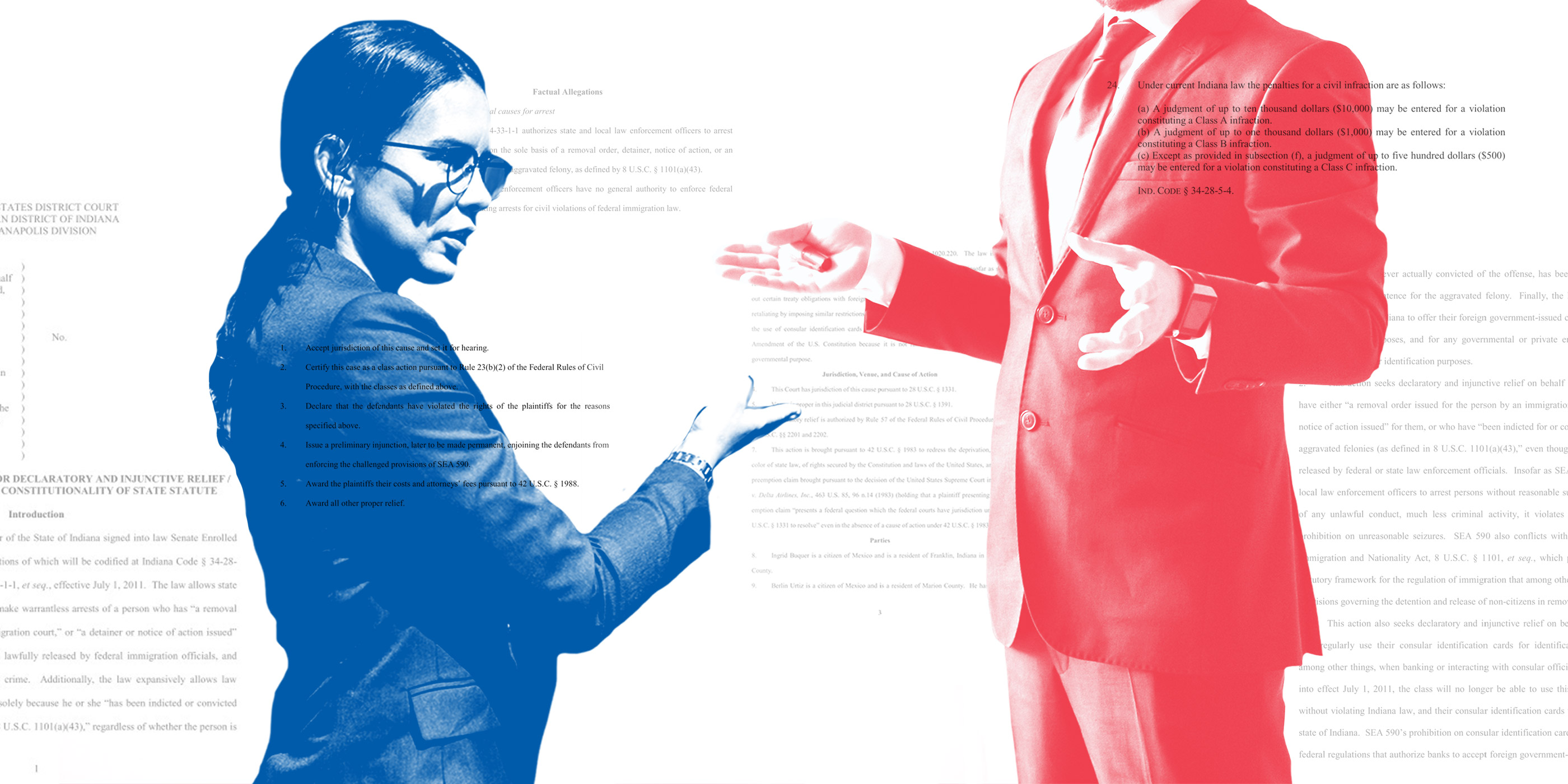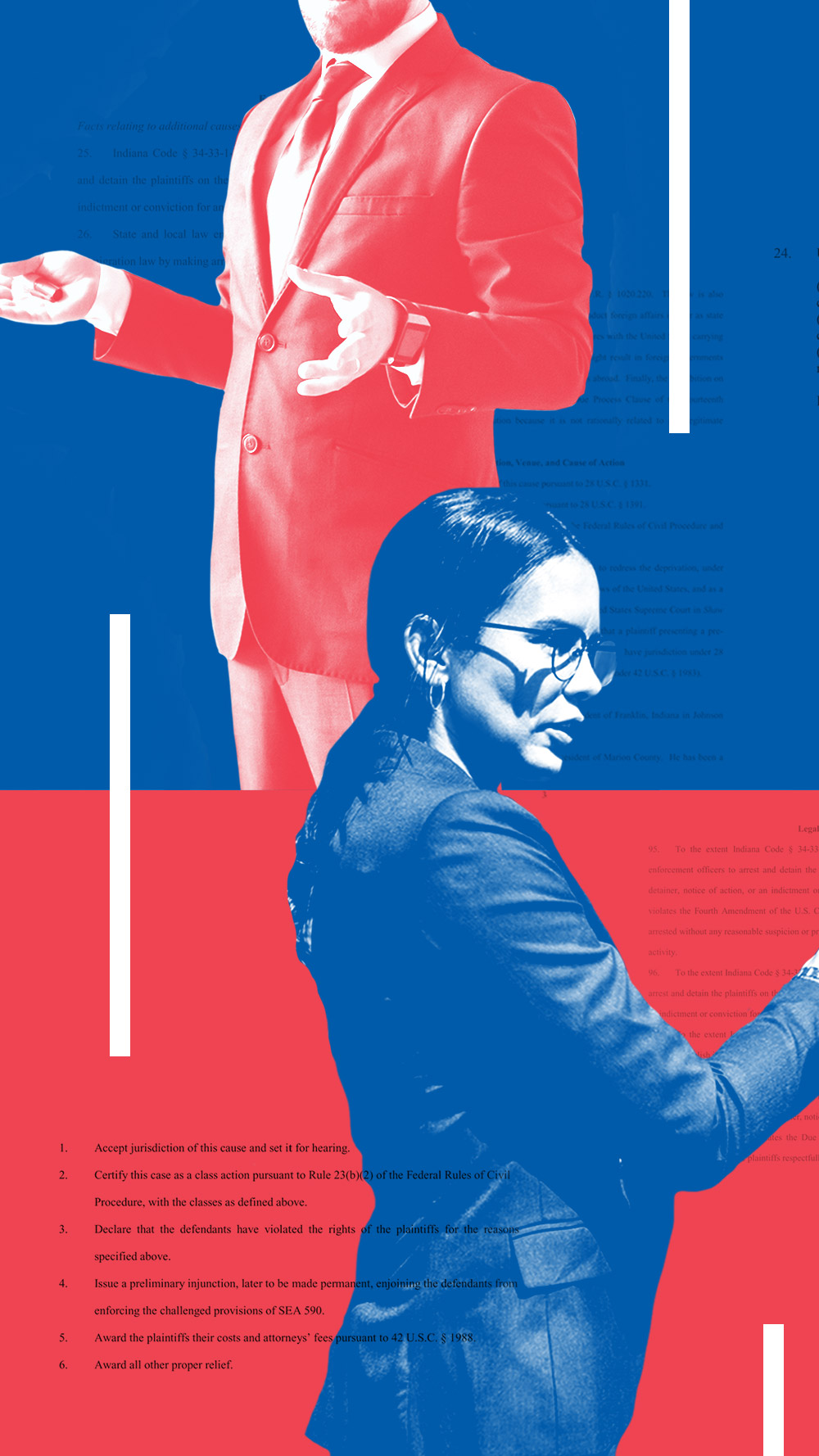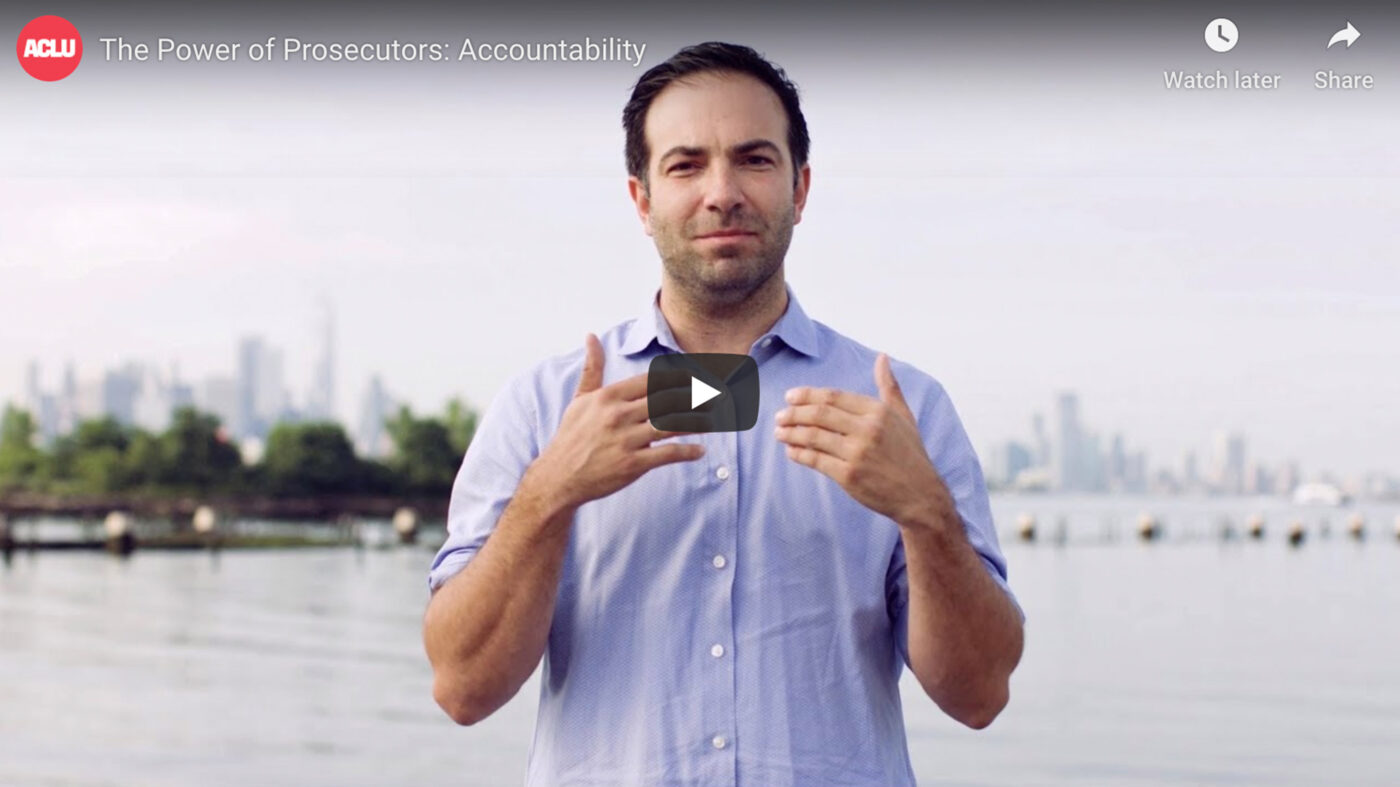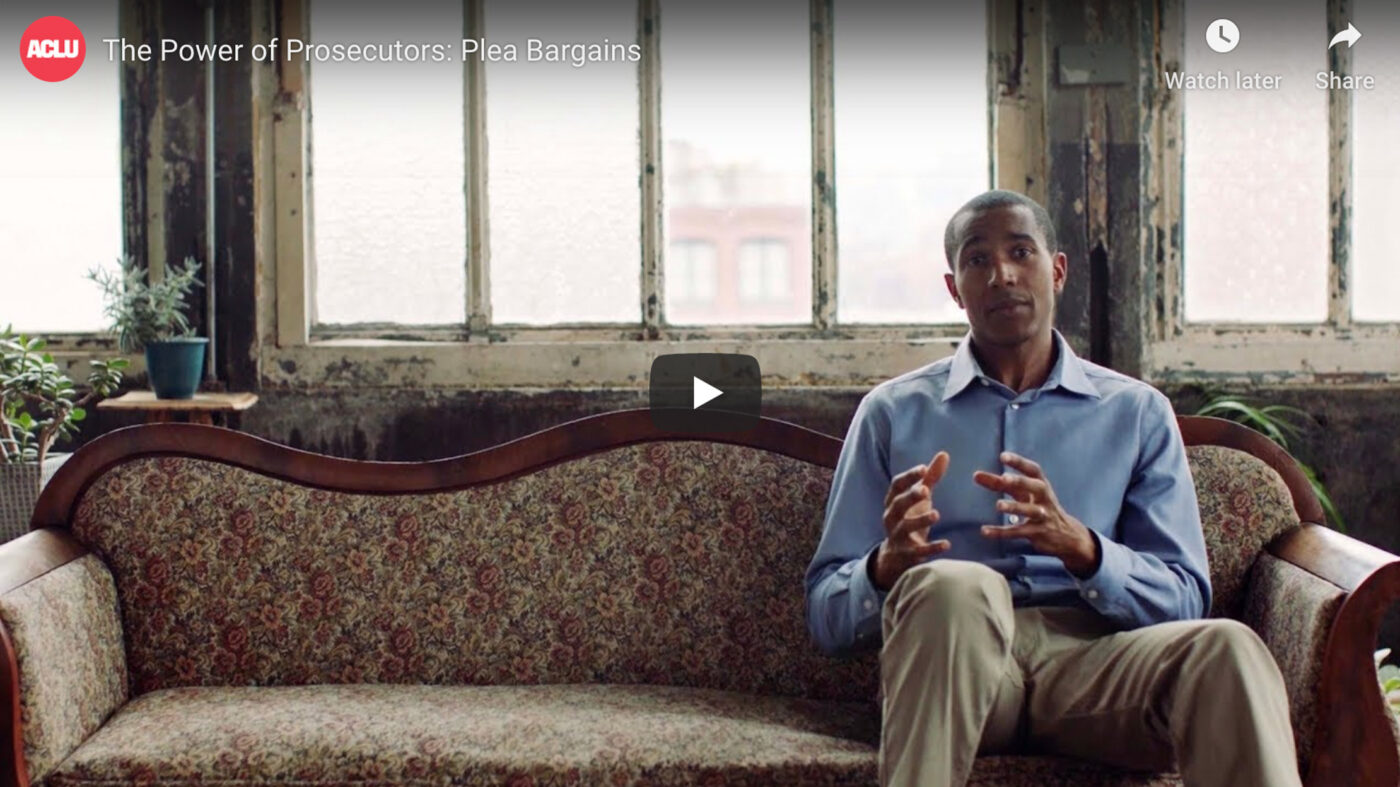It’s Time to Transform What it Means to be a Prosecutor


The United States is the largest incarcerator in the world, with over two million people behind bars — roughly a quarter of whom are simply awaiting trial — and over 11 million people cycling through prisons and jails every year. Millions more are under some form of state supervision, such as parole or probation.
Many players have a hand in our mass incarceration crisis, but there’s one actor with almost unlimited power to determine who ends up locked up and who goes free — the power to charge (or not), to divert people from incarceration (or not), to plea bargain (or not). That person is the prosecutor.
Despite the fact that fewer people are being arrested, our prisons and jails have swelled in large part because prosecutors have increasingly elected to seek the most punitive possible charges with the longest prison sentences for crimes that would have been charged as low-level offenses in previous years. At the same time, public defense in most of the country is disrespected and underfunded, with prosecutors failing to recognize their duty to ensure a fair fight. The current system is responsible for the following realities:
- One out of every three Black boys born today can expect to go to prison in his lifetime, compared to one out of 17 white boys.
- Women are now the fastest-growing population in jails and prisons, and the imprisonment rate for Black women is about twice the rate for white women.
- An estimated half of the people in prison have some indicator of a mental health disorder.
- States engage in behaviors that prevent fair, transparent trials, such as withholding evidence, predatory plea bargaining, and racist jury selection.
We too often believe that these realities are simply the result of clear laws, and that prosecutors are just doing their jobs. But prosecutors make choices every day that determine which laws are enforced and against whom, and how much punishment they carry. For too long, they have made choices that perpetuate mass incarceration rather than tear it down.
Prosecutors have the power to address the harms they’ve caused
Prosecutors not only have the power to ruin lives — they have the power to repair damage in local communities and protect people from further harms caused by the criminal legal system. As we’ve seen in a handful of places around the country, prosecutors committed to reform can use their discretion to choose liberty over incarceration and rehabilitation over punishment. They can also use their immense lobbying power to champion systemic reforms — even those outside their direct purview — including sentencing reductions, expanded clemency, humane probation and parole, and providing more resources to public defenders.
A transformational prosecutor is one with a fundamentally new approach to their work; a prosecutor who is committed to using their power to end mass incarceration and rectifying racial disparities that for too long have defined our criminal legal system. A transformational prosecutor is committed to advocating for and working with public defenders to ensure charges and sentences are fair and that the justice system is living up to its name. They will set decarceration goals, pledge radical transparency, be a vocal force for reform legislation, and prioritize fighting the mass incarceration crisis as part of their role. Moreover, a truly transformational prosecutor actively seeks to shrink their own influence in the criminal legal system, including by shrinking their own discretion. Shrinking the prosecutorial function will allow other experts — mental health providers, addiction specialists, housing providers, etc. — to assume more prominent roles in addressing and reducing harm in society, largely leaving ineffective incarceration behind.
Here’s what prosecutors need to reform:
A transformed prosecutorial system will be fully transparent and accountable. Prosecutors must strive for diversion over incarceration, and should conduct any plea bargaining fairly. These are key elements of prosecutorial reform that we’ll be fighting for throughout 2020 and beyond — until America is no longer known for its incarceration crisis and over-empowered prosecutors but for rebuilding and shrinking a broken criminal legal system.
Transparency
Prosecutors’ offices are often black boxes, with little information publicly available about their policies and practices. This is how prosecutors often get away with misconduct. Accountability and even basic education of community members and voters are virtually impossible without transparency.
Across the country, many prosecutors are beginning to change their ways, voluntarily disclosing information about their offices. These prosecutors have realized that transparency has benefits for everyone, including them. Transparency is good for both prosecutors and the public. It helps people understand what’s happening in prosecutors’ offices -- who’s being charged and for what, whether sentences are being applied fairly, and what kind of outcomes result. For prosecutors, transparency is a way to build community trust, which is essential to their jobs.
Still, too many prosecutors are trying to shut their office doors. The ACLU is fighting back through litigation and legislation, filing FOIA requests where necessary, writing and advocating for state transparency bills, and working with prosecutors themselves to bring their work out of the black box and into the light.
Read more about transparency
- Spotlight: A New Wave of Prosecutorial Transparency
- Unlocking the Black Box: How the Prosecutorial Transparency Act Will Empower Communities and Help End Mass Incarceration
- We’re Suing Maricopa County Attorney Bill Montgomery to Release the Records He’s Hiding From Arizonans
- Jeff Sessions Is Fighting Tennessee’s Effort to Make Prosecution More Fair
- Chicago's Top Prosecutor Walks the Walk on Transparency
- Voters Can’t Elect the Right Prosecutors if These Elected Officials’ Records Aren’t Made Public
Litigation
Advocacy
Accountability
Prosecutors work without any meaningful oversight whatsoever. Judge-made legal doctrines, such as absolute immunity, shield them from civil rights suits by the wrongfully targeted. Legislatures routinely approve their annual budgets with little to no inquiry into their efficiency. Citizen oversight boards are non-existent. And their internal ethics mechanisms are notoriously toothless. In other words, no one polices prosecutors — the injustice of our criminal legal system continues unabated because of this notorious lack of oversight.

But most prosecutors are not appointed, they are elected. A majority of voters across the country — from red and blue states alike — strongly prefer prosecutors who are committed to increasing transparency and holding their own accountable.
Our campaign will seek to close these gaps in accountability and empower regular people to better control the criminal legal system, which operates in their names.
Read more about accountability
Litigation
Diversion
As the public learns of the cruelty and inefficacy of mass incarceration, many reformers have championed the growth of diversion programs as an alternative way to prosecute people. The term “diversion” encompasses a vast and ill-defined landscape of programs, from private for-profit companies charging $5,000 for drunk driving courses to fully-staffed veterans’ courts that work closely with defendants to ensure they graduate better off than they were when they were arrested. In most instances, prosecutors have enormous power over who is admitted to a diversion track.
Diversion programs must be carefully monitored to ensure that they are fairly administered — first and foremost, they must not become “cash cow” fee generators for the courts or prosecutors. They must be available to all eligible people regardless of a defendant’s ability to pay. And prosecutors must ensure they are not more willing to offer diversion to white defendants compared to Black, Latinx, Asian, and Native American defendants.
Even if a defendant is able to avoid jail time for a particular charge, a criminal record comes with life-changing and often life-long collateral consequences. It makes getting a job more difficult, and sometimes outright impossible. It disqualifies you from many housing options. And the experience of being incarcerated can leave lifelong emotional scars that hinder your ability to reenter society as a returning citizen. Diversion is an excellent opportunity to improve these outcomes — but only if it in fact includes the ability to seal or expunge a conviction upon successful completion.
Diversion is an impactful decarceration method, yet it’s vastly underutilized. Too often it is only applied to low-level “quality of life” cases — which should not be in the criminal system to begin with. Indeed, people who are better served outside the criminal legal system should never get pulled into it. Communities and emergency services should divert them pre-arrest into community-based treatment and other services that can help them, such as crisis stabilization centers run by medical professionals and peer crisis services run by people who have experience living with a mental illness. Every system actor must adopt early screening and diversion options to find and help those people out of jails and prisons and into these services. Prosecutors, armed with vast discretion, are well-positioned to adopt these practices — but too often that discretion is weaponized against communities of color and impoverished people, instead of for them.
Read more about diversion
Litigation
Plea Bargains
By the numbers, we don’t have a plea bargain system. We have a plea extraction system. Prosecutors win over 90 percent of convictions through plea “bargains,” which are not bargains at all. Prosecutors often extract pleas via coercive tools like pretrial detention and mandatory minimums. In most cases, prosecutors are able to ratchet up defendants’ trial exposure so high that any rational person — likely sitting in jail, separated from their job and family — would plead out to avoid any risk of that devastating sentence. This needs to stop.

Plea extraction is also a major factor fueling racial disparities in the system. Black defendants are less likely to receive any leniency in plea bargaining for having a clean record. That’s because prosecutors have wide discretion in setting plea terms and, like all of us, bring bias to the table.
And of course, like other prosecutorial powers, plea bargaining largely takes place behind closed doors. We aim to expose the practice of plea bargaining and establish legal guidelines that make it a fair and constitutional fight.
Read more about plea bargaining
- Coercive Plea Bargaining Has Poisoned the Criminal Justice System. It’s Time to Suck the Venom Out.
- The Power of the Prosecutor: A Personal Account
A Transformational Prosecutor Seeks Liberty Over Incarceration and Rehabilitation over Punishment
For decades, prosecutors have used their virtually unchecked discretion to mold a deeply unfair system that relies on incarceration, perpetuates poverty, and deepens racial inequalities. But prosecutors don’t have to be oppressive actors in our criminal legal system — just as they have the power to harm, they have the power to heal. Many prosecutors are already taking steps in the right direction, and it’s due largely to voters, activists, and litigators who’ve made clear that it’s time for reform.

